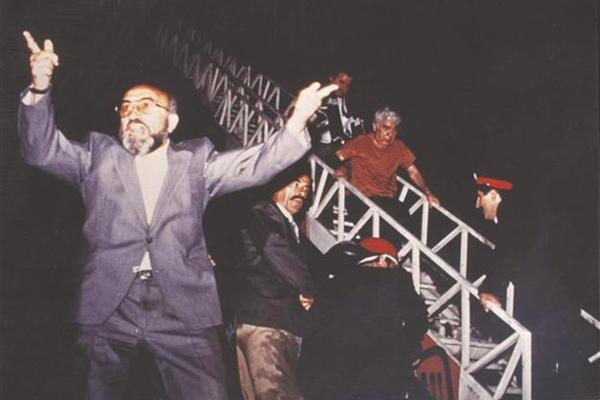Turkish writer Aziz Nesin died in sorrow of Sivas massacre, says his son
ISTANBUL - Hürriyet Daily News


Aziz Nesin (2R) is seen while leaving Madımak Hotel, where 35 were killed.
Professor Ali Nesin, son of the renowned writer and humorist Aziz Nesin, has said his father broke down after the Sivas massacre and died within two years of the attack, commemorating the 20th anniversary of the July 2 violence.Ali Nesin said his father had suffered much because of the “allegations against him, as well as the sorrow of the deceased” that came after the massacre in the Central Anatolian city of Sivas, in which an Islamist mob set fire to a hotel on July 2, 1993, during a culture festival in the city, killing 35 people.
Nesin, who currently chairs the Mathematics Department at Istanbul’s Bilgi University, said there were two kinds of offenders in the Sivas incidents. “On one side there are the attackers and on the other side are those who urged them to do it. The attackers have received – though partial – punishments, but we do not have any clue yet as to who were in the second group,” he said. On July 2, 1993 a group of radical Islamists gathered around the Madımak Hotel in Sivas, in which an Alevi cultural festival was taking place, setting the building on fire after an hours-long siege. The fire killed 33 intellectuals and two hotel personnel.
Aziz Nesin was one of the few people who managed to escape from the Madımak Hotel.
The cultural festival was named after Pir Sultan Abdal, a 16th century Turkish folk poet who was raised with Alevi traditions and who performed in the same line of tradition.
Nesin said his father, whose remarks in Sivas one day before the attack were cited as the trigger for the attack, had been unable to recover after the incident. Aziz Nesin, who was never shy of making his anti-religion views public, was also under fire and receiving death threats at the time for translating Salman Rushdie’s “The Satanic Verses.”
‘Died in two years’
“He was devastated, and he died in just two years,” the professor said of Aziz Nesin. “The pain of those killed aside, he was worn down by the accusations.”
Nesin stressed that he hoped the Turkish nation could look forward to a happy future rather than a past that was filled with sadness. He added that this did not mean that the Turkish nation should forget the past, but rather that lessons should be taken from it. The first lesson to be taken from the Gezi Park protests, Nesin said, was that the Turkish nation would never come under oppression again.
“Turkey has become a different country with the AKP [the ruling Justice and Development Party]. We cannot avoid the fact that most of our fears have disappeared, we have freed ourselves from oppression, and that the architect of this is no doubt the prime minister [Recep Tayyip Erdoğan],” said Nesin.
He said that even though he tried to put himself in the shoes of the people in power, he could not understand why the AKP insisted on naming the third bridge across the Bosphorus after the notorious Yavuz Sultan Selim, known for his notorious slaughtering of Alevis. “It’s like the government is shooting itself in the foot these past few months,” Nesin said.
